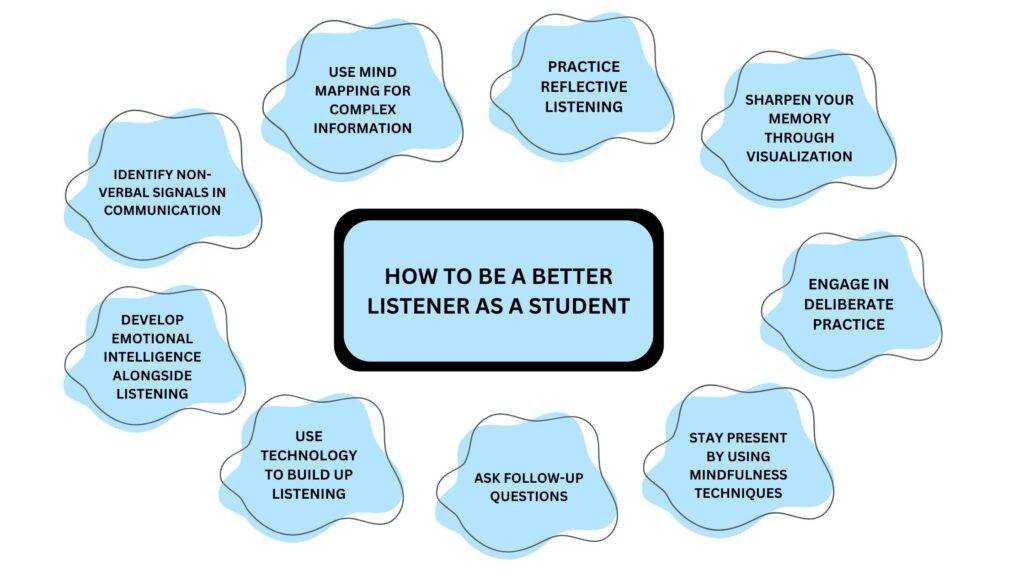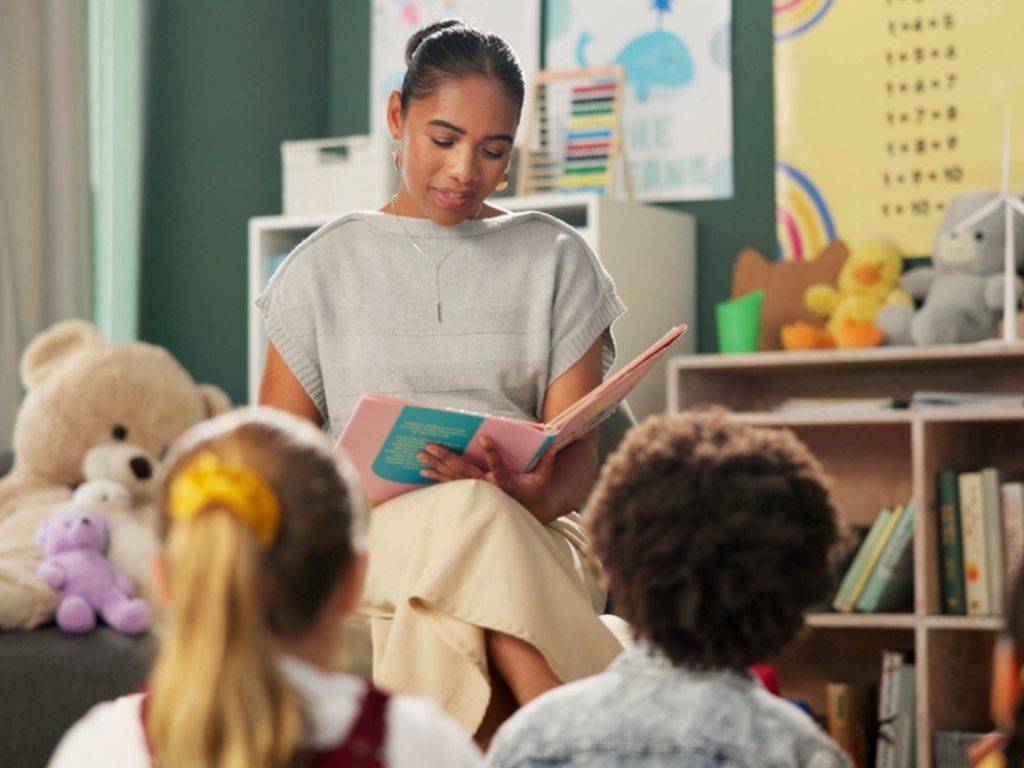In the modern landscape where a lot of information is available at supersonic speed, it is very easy to forget one of the key elements: listening. This is even more so the case for students. In a classroom, group discussion or even amongst friends, the ability to listen can enhance learning and relationship building to great extents.
What does listening really mean in practical terms? In what way would developing this ability not only increase your knowledge but allow you to connect with other people more properly? Let us explore the significance of listening and how you can become a great listener as a student.
Also Read: Understanding Listening Skills: 7 Tips for Improvement
Why Listening Matters as a Student
As a learner, a large part of your education is based on listening to others. Whether it’s in lectures or group work or other scenarios, the better you listen, the better you remember. Listening helps people comprehend the lessons, interact with their peers constructively, and most importantly, know what questions to pose and when.
However, it’s not only the gain of knowledge that is important. It also assists in nurturing relationships. It tells people that you respect their views and what they have to communicate. When engaging in group studies or carrying out a task in teams, a good listener facilitates communication which in turn enhances working together.
Also Read: 10 Common Barriers to Effective Listening
Sadly, too many of us take for granted that we are actively listening when we just hear the sounds of the words. Yet listening is an active process and I do think we listen more attentively than that. It calls for concentration, patience, and the willingness to process the information conveyed by the speaker.

How to Be a Better Listener as a Student
So, how can you improve your listening skills and overcome these barriers? Here are some simple but effective tips:
1. Identify Non-Verbal Signals In Communication
Listening isn’t just about hearing words—it’s also about understanding non-verbal communication. Pay attention to body language, facial expressions, and tone of voice. These cues often reveal underlying emotions or unspoken messages. For example, if a classmate says they understand a topic but looks confused, they may need further clarification. Recognizing these cues can help you respond more effectively.
Also Read: Outstanding Activities for Developing Listening Skills
By focusing on these non-verbal signals, you become a more intuitive listener. This can be especially helpful in group discussions or when trying to gauge whether someone is truly comfortable with a topic. However, if you want expert guidance in your child’s journey to become a good listener, then you can simply enroll your child in Dr. Kishore’s Ratnam Schools.
2. Use Mind Mapping for Complex Information
When you’re listening to detailed or complex information, such as during lectures or deep discussions, consider using mind mapping as a way to organize what you’re hearing. A mind map visually lays out key concepts and connections between ideas, helping you to better understand and retain the material.
Also Read: Best Life Skills Activities for Students & Kids
Mind maps work by engaging both the logical and creative parts of your brain, allowing you to process information more deeply. This method can be particularly useful in subjects like science, history, or literature, where topics are interconnected.
3. Practice Reflective Listening
Reflective listening goes a step beyond active listening by focusing on the emotional content of a conversation. It involves acknowledging the feelings behind the speaker’s words and reflecting them back in a compassionate way. For example, when a friend expresses frustration about a difficult assignment, you might say, “It sounds like you’re feeling really overwhelmed by the workload.”
Also Read: Causes of Poor & Bad Handwriting
This advanced technique builds emotional connection and trust. It is especially valuable in peer relationships, study groups, or when listening to feedback from teachers.
4. Sharpen Your Memory Through Visualization
A powerful listening tool that many students overlook is the ability to visualize what you’re hearing. When someone explains a concept, imagine it visually in your mind. For example, if you’re learning about historical events, picture them unfolding as a movie. If it’s a complex mathematical concept, visualize the steps and processes as clearly as possible.
Also Read: Qualities & Characteristics of a Good Student
Visualization helps in long-term retention, which is particularly useful during lectures where key ideas are presented quickly. This approach enhances comprehension and strengthens your mental connections to the material, giving you a more robust understanding of what you’re learning.
5. Engage in Deliberate Practice
Listening, like any skill, can improve with focused practice. One way to enhance your listening abilities is to deliberately set aside time to improve specific aspects of your listening. For instance, during a study session, you could focus on summarizing a lecture immediately after hearing it to test how well you’ve listened. At Dr. Kishore’s Ratnam schools in AP various exercises are tailored for students specifically to help them achieve their goals faster.
Also Read: Eco-Friendly School Ideas: 12 Ways to Go Green
Deliberate practice involves setting goals, seeking feedback, and constantly refining your approach. Over time, you’ll notice improvements in how much information you can retain and how well you engage in conversations.
6. Stay Present by Using Mindfulness Techniques
Mindfulness techniques, such as deep breathing or grounding exercises, can help you remain fully present during a conversation or lecture. Often, students’ minds wander to other tasks or worries, which limits their ability to focus. By practicing mindfulness, you can bring your attention back to the present moment and fully engage with the speaker.
Also Read: How to Improve Reading Skills: 7 Reading Activities to Try
One simple technique is to take a few deep breaths before the conversation begins. This reduces stress, calms your mind, and prepares you to listen more attentively. Practicing mindfulness regularly can enhance your focus, allowing you to absorb more information with clarity.
7. Ask Follow-Up Questions
While asking questions is a basic part of active listening, going further with follow-up questions can deepen your understanding and show the speaker that you’re genuinely engaged. These types of questions often dig into the “why” or “how” of what’s being said. For instance, if a teacher explains a concept in class, you might ask, “Can you explain why this theory is applied in this way?”
This type of inquiry not only helps you clarify complex topics but also encourages critical thinking. It pushes both you and the speaker to explore the subject more thoroughly, fostering deeper learning.
8. Use Technology to Build Up Listening
As a modern student, you can leverage technology to improve your listening skills. For instance, recording lectures (with permission) allows you to replay them later and catch details you might have missed the first time. There are also apps that help you practice focused listening by offering exercises that develop your auditory memory and concentration.
Another example is speech-to-text apps, which transcribe spoken words into written text in real-time. This can be particularly helpful for students who want to double-check their understanding or have difficulty keeping up with rapid speech.
9. Develop Emotional Intelligence Alongside Listening
Emotional intelligence (EQ) is crucial for interpreting not just what people say but how they feel. As you listen, consider how your emotional response might be influencing your understanding of the conversation. Are you reacting with empathy or judgment? Do you find yourself getting distracted by your own emotions instead of focusing on the speaker?
Improving your emotional intelligence can lead to better relationships with your peers and teachers. When you’re able to recognize both your own emotions and those of others, you’ll be able to respond more thoughtfully and build stronger connections.
Also Read: Which are the 10 Best Engaging Literary Activities for Students?
What are the Benefits of Being a Good Listener?
So, what can you gain by improving your listening skills? For one, you’ll likely see an improvement in your academic performance. By actively listening during lectures and discussions, you’ll retain more information and understand concepts more deeply.
You’ll also enhance your relationships. When people feel heard, they’re more likely to engage with you positively. In group projects, this can lead to smoother communication and better teamwork. In personal relationships, it fosters trust and connection.
Listening also helps you become a better communicator. The more you listen, the more you learn how to respond thoughtfully and meaningfully.
Also Read: How to Overcome Mock Test Anxiety
Conclusion: Listening is a Superpower
In a world full of distractions, learning to listen is like unlocking a superpower. It can transform your learning, improve your relationships, and make you a more thoughtful person. So, next time you’re in class, chatting with a friend, or participating in a group discussion, challenge yourself to listen more closely.
By doing so, you’ll not only absorb more information but also build stronger connections with those around you.


